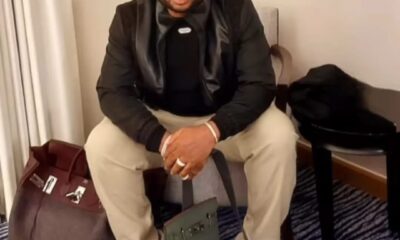Trending
Yvette Cooper warns hostile states could be whipping up rioters
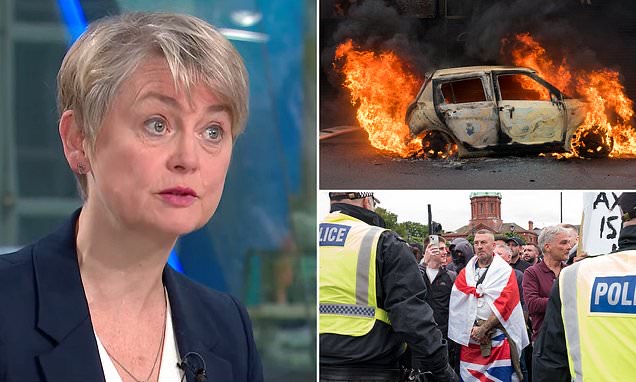
Yvette Cooper today warned hostile states may be ‘amplifying’ online misinformation blamed for whipping up riots in the wake of the Southport stabbing attack.
The Home Secretary did not rule out foreign interference as one of the factors behind the outbreak of violent disorder on Britain’s streets.
But, following a fresh night of chaos across the country, Ms Cooper insisted the Government’s immediate focus was on clamping down on local groups.
She also issued another demand for social media companies to remove criminal material and hate-filled misinformation from their sites.
The Home Secretary called for tech bosses to hold ‘a sense of responsibility towards communities’ amid the far right violence.
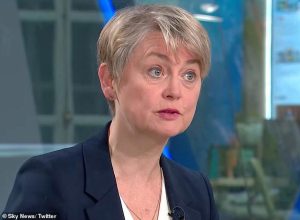
Yvette Cooper warned hostile states may be ‘amplifying’ online misinformation blamed for whipping up riots in the wake of the Southport stabbing attack
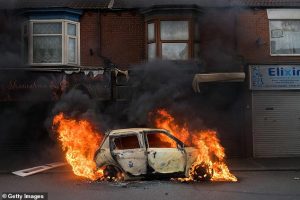
A car burns on Parliament Road in Middlesbrugh after it was set alight by far right thugs
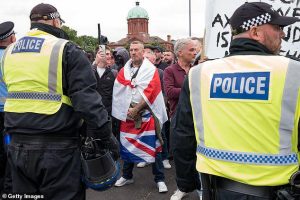
A man dressed in England and Union Jack flags faces police officers in Middlesbrough
Lord Walney, the Government’s adviser on political violence and disruption, has said far right actors are ‘almost certainly’ being ‘aided and abetted’ by hostile states.
He claimed they had helped ‘in creating and planning disinformation to put out false narratives’.
James Cleverly, Ms Cooper’s predecessor as home secretary, has also said the riots have ‘all the hallmarks’ of something that has partly been stoked from abroad.
Appearing on Sky News this morning, Ms Cooper was asked if she had similarly determined whether foreign states could be involved in helping sow the chaos.
‘We know that there can be amplification of social media activity,’ she replied.
‘I think our focus right now is on local groups and organisations, including some of those who are fulled by far right extremists.
‘But also those who were just local looters who came to join in and committed crimes and that is our focus right now.
‘To make sure they pay the price for their crimes.’
She added: ‘There is also an issue about the online criminality that we’ve seen and social media has clearly put rocket boosters under some of the organisation, the inflaming of tensions, and also the misinformation that was spread as well.
‘So we do also expect to see action against those who were posting criminal material online as well, and also to make sure the social media companies take some responsibility for this.
‘Because they have terms and conditions they have to meet in terms of both misinformation and also criminal material that is available online.’
Pressed about what action social media firms should be taking, the Home Secretary said it was ‘not acceptable’ they had scaled down efforts to tackle misinformation following the conclusion of the general election campaign.
‘They did have arrangements in place around removing misinformation during the general election campaign,’ she said.
‘Some of that has stopped – that’s not acceptable, they have terms and conditions that they should be meeting.
‘Some of this is around criminal material that they should be removing.
‘But they also actually just have to have a sense of responsibility towards communities where we’ve seen the consequences in certain towns and cities.
‘So we will be pursuing this with the social media companies.’
Mr Cleverly said, when he was home secretary, he knew of a ‘very pernicious online culture’ had been ‘amplified’ from beyond Britain’s borders.
‘I was well aware of a very pernicious online culture perpertrated by the far right, amplified both within the UK and beyond our borders,’ he told the TV news channel.
‘This has all the hallmarks of something which has been stoked by that.’
News
Actress Doris Ogala doubles down on claims against Pastor Chris Okafor, insists on compensation or marriage

Actress Doris Ogala has intensified her allegations against Pastor Chris Okafor, insisting she was in a long-term relationship with him from 2017 and was promised marriage.
Speaking emotionally, Doris claimed she supported the pastor privately, bought gifts for his children, and stayed loyal for years, only to be abandoned when he decided to marry someone else.
She accused those online, including Dee One, of taking money to do “damage control,” stressing that her demands are legal, not blackmail. According to her, she is seeking compensation for emotional damage, career loss, and broken promises, adding that her lawyer is already preparing formal demands.
Doris also admitted to phone-based intimacy during her troubled marriage but denied any physical affair at the time. She maintained she has evidence to back her claims and alleged she is not the only woman Pastor Chris promised marriage.
“I’m not backing down. This is my right,” she said, warning that she is ready to speak fully if pushed further.
https://www.instagram.com/p/DSVHaVegjI7/?igsh=ZG1jNWNnZjN4YWZt
Trending
‘It’s a Lie’ —Akpabio denies claims he collapsed, hospitalised in London

Nigeria’s 10th Senate president, Godswill Akpabio, dismissed claims that he collapsed and was flown to a hospital in London for treatment.
Kenny Okolugbo, Consultant on Communications and Strategy to the Senate President, said the claim about Akpabio’s health wealth was false.
When contacted by Ekwutosblog on the development, Okolugbo simply said, “It’s a lie, fake news,” without further details.
This comes amid a report on Monday by an online news platform that alleged the Senate president collapsed and was flown on a private jet to London for treatment.
EVENTS
PRESIDENT TINUBU CONGRATULATES SENATOR IFEANYI ARARUME ON HIS BIRTHDAY

President Bola Tinubu felicitates Senator Ifeanyi Godwin Ararume, astute politician and accomplished businessman, on his birthday, December 16.
Senator Ararume’s odyssey in politics began in the late 1980s, when he served as the State Treasurer of the Liberal Convention in old Imo State. He later joined the National Finance Committee of the defunct National Republican Convention.
He represented Imo North in the 9th National Assembly. He was first elected in May 1999 and re-elected in April 2003. He also served on several committees and held other official roles.
President Tinubu commends the former senator for his years of service to the nation and contributions to its peace, unity, and progress.
The President describes Senator Ararume as a resolute and shrewd politician, highlighting his courageous and remarkable political journey through the years.
President Tinubu wishes Senator Ararume a happy 67th birthday and prays that God Almighty will grant him more years of good health and strength.
-
Business1 year ago
US court acquits Air Peace boss, slams Mayfield $4000 fine
-

 Trending1 year ago
Trending1 year agoNYA demands release of ‘abducted’ Imo chairman, preaches good governance
-

 Politics1 year ago
Politics1 year agoMexico’s new president causes concern just weeks before the US elections
-

 Politics1 year ago
Politics1 year agoPutin invites 20 world leaders
-

 Politics1 year ago
Politics1 year agoRussia bans imports of agro-products from Kazakhstan after refusal to join BRICS
-
Entertainment1 year ago
Bobrisky falls ill in police custody, rushed to hospital
-
Entertainment1 year ago
Bobrisky transferred from Immigration to FCID, spends night behind bars
-
Education1 year ago
GOVERNOR FUBARA APPOINTS COUNCIL MEMBERS FOR KEN SARO-WIWA POLYTECHNIC BORI





